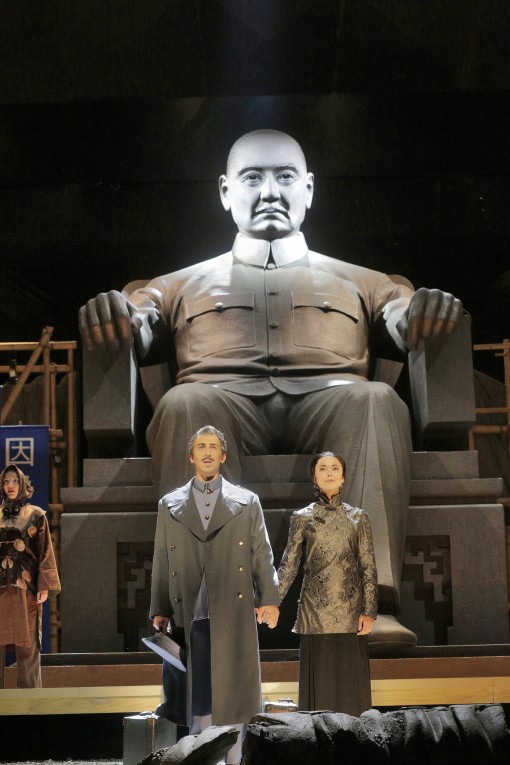Santa Fe Opera’s leaden “Dr. Sun Yat-sen” leaves one hungry for more musical substance

Joseph Dennis and Corinne Winters in Huang Ruo’s “Dr. Sun Yat-sen” at Santa Fe Opera. Photo: Ken Howard
When Santa Fe Opera decided to pull the plug on the world premiere of Judith Weir’s new opera Miss Fortune this year, the company settled instead on an American premiere. For the final production of the season, it has presented Dr. Sun Yat-sen, the first opera by Huang Ruo, a little-known China-born American composer. The results, in no uncertain terms, were disappointing.
First, there was controversy. The opera was to have had its premiere at the National Center for the Performing Arts in Beijing in 2011, but about a month before the premiere, Communist Party officials announced that it would be “postponed indefinitely” for logistical reasons. The commission came from Opera Hong Kong, which went ahead with its scheduled performance that year, but another production at the Guangzhou Opera House was also canceled, leading to speculation that the opera was being censored in mainland China for some reason.
The libretto, by Candace Mui-ngam Chong, covers roughly a decade, 1910 to 1918, in the life of Sun Yat-sen, the Chinese revolutionary. He helped to depose the last Qing emperor and establish the Republic of China in 1912, serving for a brief time as its first president. The opera also touches on the early years of the ROC under Yuan Shikai, who tried to establish himself as a new emperor, when Sun Yat-sen was in exile in Japan, and the battle between nationalist forces and warlords in the wake of Yuan’s death.
After the rise of the communists, who established the People’s Republic of China on the mainland, Sun Yat-sen’s successor in the Kuomintang nationalist party, Chiang Kai-Shek, moved the ROC to the island of Taiwan, where it remains today, unrecognized by the mainland government. The opera may have appealed initially to the communist government because of the love story involving Sun’s much younger second wife, Soong Ching-ling, who went on to become a leading political figure in the People’s Republic of China, but perhaps something else about the story set off alarm bells.
Of course, it is also possible that Beijing rejected Dr. Sun Yat-sen because the opera is leaden, repetitive, and dramatically weak. This was the librettist’s first attempt at a libretto, and the lack of experience shows, for example, in a love duet that contains the lines, in translation, “Ching-ling, you are the best that has happened to me. Your presence in my life both amazes and humbles me.” Too much action is telescoped into too many montage-like scenes — and this is after the opera has been shortened from its Hong Kong version — yet we end up with little idea of why Sun Yat-sen is a revered figure.
Musically, things were no better, with a score that is static and dull, aside from a few exotic sounds from Chinese instruments mixed with the orchestra. For most of the two hours, Ruo established a square pulse, often with drums and other percussion, relying on repetitive syncopations to jar the sense of downbeat, until the singers entered, when the accompaniment became monochromatic and sparse, with lots of open sonorities passed from instruments to other instruments. Sometimes, the prevailing motif was repeated notes (I have never endured so many unisons and open fifths in a night at the theater), or long notes, or trills, or tremolo or flutter-tongue, but the formula was always the same. Happily, Ruo showed evidence that he had improved in his handling of an orchestra and melodic writing in his second opera, An American Soldier, premiered in Washington earlier this summer.
The singing was all quite good, beginning with the demure but high-flying soprano of Corinne Winters as Sun’s young wife. Warren Mok, who created the title role in Hong Kong, pulled out of the production because of some discomfort with this version’s larger, Western-style orchestra. Tenor Joseph Dennis, the apprentice singer who was covering the role, filled in valiantly, with the necessary high notes, but was not ready for the burden of creating such a charismatic character. Gong Dong-Jian and MaryAnn McCormick were a congenial pair as Sun’s supportive friends in China, as were Chen Ye Yuan and Katherine Carroll as his supportive friends in Japan. Rebecca Witty had a sympathetic turn as Sun’s sad sack of a first wife.
Conductor Carolyn Kuan was incisive and precise at the podium, and the musicians and chorus did the best they could with what they were given. The production, directed by James Robinson, was rather drab (sets by Allen Moyer, costumes by James Schuette) and traded too much on clichés: if bamboo scaffolding and bits of terra-cotta warrior statues (why not panda bears?). The only memorable effect was the unveiling of an enormous seated statue of the title character at the end. Choreography by Seán Curran, showing poor Chinese peasants being ignored and trampled down by aristocrats, looked like something Madame Mao would have approved.
The final performance of Dr. Sun Yat-sen will be August 14. santafeopera.org.
Charles T. Downey is a freelance writer on music and roving summer festival reporter. The rest of the year he lives in Washington, D.C., where he writes reviews for the Washington Post and moderates ionarts.org, a Web site on classical music and the arts.